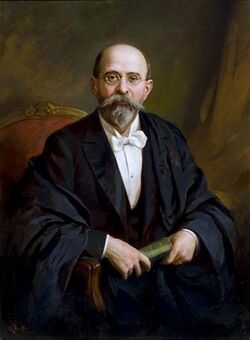Biography:John Caruana
Giovanni Caruana | |
|---|---|
| Born | 1866 Valletta, Malta |
| Died | July 31, 1923 Malta |
| Occupation | Professor of Civil Law and Political Economy |
Giovanni Caruana (1866–1923) was a Maltese lawyer and minor philosopher. He was mostly interested in the philosophy of law and in political economy.[1] At least two portraits of Caruana exist, both by the renowned early 20th century Maltese artist Edward Caruana Dingli. Both were displayed at an exhibition on Caruana Dingli at the National Museum of Fine Arts in Valletta, Malta, in 2010.[2]
Life
Caruana was likely born at his father's Valletta house at 266, St Paul's Street, in 1866. He was the son of an influential man, Prof. Antonio Annetto Caruana, who was an archeologist, librarian, Director of Education, and Rector of the University of Malta.
Caruana studied law at the University of Malta, and continued his studies in England and in Italy. He became professor of political economy at the University of Malta in 1889, and later Professor of Constitutional Law. In 1895 he was also appointed Professor of Civil Law. His teaching career spanned over thirty years. He retired in 1921.
Works
Intellectually, liberalism was what seemed to preoccupy Caruana most. Amongst his various works, one is noteworthy for its philosophical value. It is Dell’Influsso della Filosofia Moderna (On the Influence of Modern Philosophy).[3] This 28-page booklet in Italian was published in Malta in 1889 (Tipografia Industriale di Giov. Muscat, Salita Guardanmangia, Pietà). The title is augmented with the qualification sulla Scienza e le Discipline Economico-sociali e della loro presente direzione (on Science and the Economic-Social Disciplines, and their present direction).
The publication reproduces a talk which Caruana delivered at the opening of the academic year 1889/90 of the University of Malta and the Lyceum. The talk was made on October 1, 1889, at the National Library of Malta, Valletta, when he was only 23 years old.
Caruana’s talk is an outright attack on liberalism. The writing has no divisions, and continuously cites Aristotle and various political economists. Cicero is cited too. Caruana exemplifies his arguments by drawing upon the situation in England . He explains how there liberalism was arresting the development of science, the economy, and the social studies. Caruana exults England as the bulwark of civilisation, and castigates liberalism for failing to keep England ’s scientific, economic and social pre-eminence on an upward and forward trajectory.
Personal
Caruana was married to Giovanna Galizia, a daughter of the celebrated Victorian architect and civil engineer Emanuele Luigi Galizia. E.L. Galizia was a personal friend of Caruana's father, the archaeologist Antonio Annetto Caruana. One of Giovanna's brothers, Major James Galizia CBE, was Director of Public Works and then Treasury Secretary in Malta's early 20th century imperial administration.[4] Another brother, Godwin Galizia, was a noteworthy neo-Romanesque and neo-classical architect.[5] Caruana had ten children with Giovanna Galizia. Their first son, Anton Caruana Galizia, a prominent Maltese lawyer, was killed outside the Casino Maltese in a German bombing raid in 1942, that left 40 others dead.[6] Daphne Caruana Galizia, the Maltese journalist assassinated in a car bomb in 2017, was married to their grandson, Peter Caruana Galizia.
References
- ↑ Montebello (2001), Vol. I, pp. 69–70
- ↑ "Fondazzjoni Patrimonju Malti :: Edward Caruana Dingli (1876-1950) - Portraits, Views and Folkloristic Scenes". http://www.patrimonju.org/Gallery.aspx?id=209027&subId=114402.
- ↑ Montebello (2001), Vol. I, p. 167
- ↑ Galizia, Paul Caruana (2016-12-20) (in en). The Economy of Modern Malta: From the Nineteenth to the Twenty-First Century. Springer. ISBN 9781137565983. https://books.google.fr/books?id=bvvFDQAAQBAJ&pg=PA139&lpg=PA139&dq=major+james+galizia&source=bl&ots=dcDKM9GZpc&sig=gmD_Egj6Mc1zqgqF700KuxOkwwY&hl=en&sa=X&ved=0ahUKEwjHteaEoJbZAhVF2qQKHaL8AR0Q6AEIVzAI#v=onepage&q=major%20james%20galizia&f=false.
- ↑ Ltd, Allied Newspapers. "The rise and fall of the Britannia Circus in Floriana" (in en-GB). Times of Malta. https://www.timesofmalta.com/articles/view/20171001/life-features/The-rise-and-fall-of-the-Britannia-Circus-in-Floriana.659347.
- ↑ "HMS Cleopatra | Malta: War Diary" (in en). https://maltagc70.wordpress.com/tag/hms-cleopatra/.
Sources
- Montebello, Mark (2001). Il-Ktieb tal-Filosofija f'Malta. Malta: PIN Publications. ISBN 9789990941838.
See also
- Philosophy in Malta



